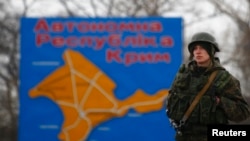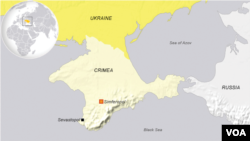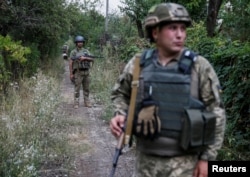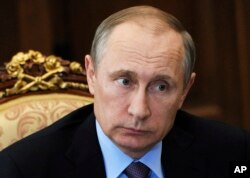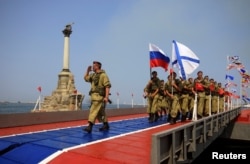Ukraine and Russia were locked in a war of words Thursday over the Kremlin’s claim that Kyiv infiltrated trained saboteurs into Crimea tasked with targeting “critical infrastructure” — an alleged mission Russian President Vladimir Putin is now citing as the reason for his decision to pull out of scheduled peace talks in Normandy.
Ukrainian officials say the sabotage mission is pure “fantasy,” arguing the Kremlin is likely to use it as a pretext for a major escalation of the two-year-long conflict in east Ukraine, where Moscow-backed forces are occupying a large chunk of the Donbas region, including the cities of Donetsk and Luhansk.
Moscow has so far failed to present the group of saboteurs it says were detained at the weekend near the city of Armyansk after the sabotage mission was thwarted.
Suspect identified
Russia’s Federal Security Service, or FSB, has identified one suspect by name — Yevhen Panov, a former Ukrainian soldier, whose family insist he went missing on August 6 while visiting a friend’s dacha in Zaporizhya oblast bordering Crimea, the Black Sea peninsula Russia annexed in 2014.
Russian state TV has been running pictures from the FSB, showing backpacks full of explosives. A still photograph of a bruised and bloody Panov has also been broadcast.
Speaking to VOA, Panov’s brother-in-law, Ihor Kotelianets, dismissed Russian claims that Panov is a trained saboteur or worked for Ukrainian intelligence. He says since leaving the army he has worked as a driver and electrical mechanic at the Zaporizhya Nuclear Power Plant, although he is a volunteer in a local self-defense force. He had recently set up in his hometown of Enerhodar a small non-profit to help Ukrainian army veterans.
“He served in the 37th brigade for a year and left August 2015. He had the chance to extend his contract but wanted to start a family with his wife and they are renovating an apartment relatives gave them,” he says.
“He left home on Friday to spend the weekend at a friend’s dacha and I tried to reach him on Saturday night and sent him an SMS but he didn’t respond,” says Kotelianets. “ By Sunday we were becoming alarmed because we hadn’t heard anything from him.”
A family friend, who asked not to be identified, also dismissed the idea that Panov was working for Ukrainian intelligence but said he wouldn’t have been surprised if he had gone to Crimea for a private business deal.
Uptick in fighting
Since June there has been a serious uptick in fighting in the Donbas. Monitors from the Organization for Security and Cooperation in Europe (OSCE) accuse both sides of violating a cease-fire agreed to in February 2015 and known as Minsk 2. But the monitors say also they are being blocked by pro-Moscow separatists from moving freely in the conflict zone, are receiving mounting threats and harassment and are unable to move at night when most of the fighting flares.
Ukraine insists that its forces in the east are merely responding to attacks mounted by the so-called separatist forces, a mix of local recruits, Russian veterans and currently serving Russian servicemen. Oleksandr Motuzyanyk, a spokesman for Ukraine's presidential administration, told VOA that there have been more than a hundred attacks on Ukrainian forces this week in the Donbas many of which involved the use of heavy artillery.
OSCE monitors privately fear that the use of heavy artillery by Russian-backed forces risks a “high probability” of greater escalation in the fighting in the east. President Putin’s rhetoric has hardened also in the last 24 hours. The Kremlin claims an FSB officer and a Russian soldier were killed in Crimea as sabotage missions were thwarted.
Putin warning
On Wednesday, Putin warned he will not just “pass over” the deaths of the two Russians.
Fears have mounted in recent weeks that the so-called ‘frozen conflict’ in the Donbas would heat up. “Observers have greatly feared that Russia’s President Vladimir Putin would start a small regional war this August,” says Anders Aslund, an analyst with the Brookings Institution, a Washington-based think tank. “Russia has moved up its State Duma [parliament] elections to September 18. Although only Putin’s parties are allowed to win, he has a predilection for ‘small and victorious wars’ to mobilize his people,” Aslund adds.
Aslund says Putin has every reason to engineer an escalation. “For the last two years, Russia’s economy has been in recession, giving Putin all the more reason to mobilize his compatriots around a small war.” August is the best time for Moscow’s military action because Western decision-makers are on vacation, he says.
“The parallels with the August 2008 Russian-Georgian war are striking. That conflict started with the Olympic games in Beijing. The United States president was a lame duck amid the presidential election campaign. Russia was pursuing a large-scale military exercise called Caucasus 2008 in the Northern Caucasus. The Kremlin blamed Georgia for an implausible attack,” he says.
“But Victor Mironenko, head of the Moscow-based Center Of Ukrainian Studies at the Russian Academy of Sciences’ Institute of Europe suspects Ukrainian intelligence was behind the incursions into Crimea. “It looks as though the initiators of the Ukrainian campaign are entangled and got the {Ukrainian] President entangled," he told VOA.
He added in an email to VOA’s Moscow bureau: ”It is obvious that it was an improvisation and now they do not know how to end it…Sooner or later, it'll become obvious to all and responsibility will have to be taken.”
Russian military maneuvers
Russia has also been preparing military maneuvers in the Crimea as part of the highly publicized Caucasus 2016 Russian army exercises.
Some Ukrainian officials had until recently dismissed reports of large Russian military conveys on the peninsula as just part of those exercises but now in the light of the increased shelling in the Donbas and the terror accusations being leveled against the Ukraine by Moscow alarm is mounting.
Ukraine’s President Petro Poroshenko lashed out at Moscow saying in a statement: "Russian accusations that Ukraine has launched terror attacks in the occupied Crimea are equally cynical and insane as its claims that there are no Russian troops in eastern Ukraine. These fantasies pursue the only goal: a pretext for more military threats against Ukraine.”
Putin told reporters Wednesday that Kyiv is “playing a dangerous game” by failing to resolve the crisis in the Donbas through talks. “I think it's obvious that Kyiv’s current authorities are not seeking for ways to solve problems through negotiations, but have turned to terrorism,” he said.
Ukraine military officials say that given the military movements in Crimea the Kremlin might be considering seizing the land route from Mariupol to Crimea.
In two weeks time Ukraine celebrates the 25th anniversary of its declaration of independence from Russia following the collapse of the Soviet Union in 1991.
VOA Moscow correspondent Daniel Schearf contributed to this report




